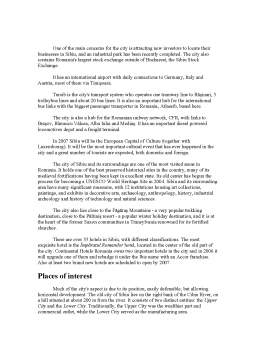Extras din referat
The city was founded in 1190 by German settlers, the so called Transylvanian Saxons(the term Saxons is in so far wrong as such colonists did not derive from the medieval region of Saxonia but from the area around the Moselle River). It was probably built near a Roman settlement, one that would have come to be known during early Middle Ages as Caedonia, which might have been deserted at the time of the Saxons' arrival.
In the 14th century, it was already an important trade center. In 1376 the craftsmen were divided in 19 guilds. Sibiu became the most important ethnic German city among the seven cities that gave Transylvania its German name Siebenbürgen (literally seven cities), and it was home to the Universitas Saxorum, the assembly of Germans in Transylvania. Common opinion in the 17th century ascribed Sibiu the quality of being the easternmost city to be part of the European sphere; it was also the eastern terminus of postal routes.
During the 18th and 19th centuries, the city became the second and later the first most important center of Transylvanian Romanian ethnics. The first Romanian-owned bank had its headquarters here (The Albina Bank), as did the ASTRA (Transylvanian Association for Romanian Literature and Romanian's People Culture). After the
Romanian Orthodox Church was granted status in the Habsburg Empire from the 1860s onwards, Sibiu became the Metropolitan seat, and the city is still regarded as the third most important center of the Romanian Orthodox Church. Between the 1848 Hungarian Revolution and 1867 (the year of the Ausgleich), Sibiu was the meeting-place of the Transylvanian Diet, which had taken its most representative form after the Empire agreed to extend voting rights in the region.
After World War I, when Austria-Hungary was dissolved, Sibiu became part of Romania; the majority of its population was still ethnic German and Hungarian. Starting from the 1950's and until after 1990, most of the city's ethnic Germans emigrated to Germany. Among the roughly 2,000 who have remained is Klaus Johannis, who is currently mayor of Sibiu.
Sibiu is one of the most prosperous cities of Romania, and also receives one of the highest rates of foreign investment in the country. It is an important manufacturer of automotive components (Bilstein-Compa, Takata, Continental, and SNR Roulments). Other local industries are machine components, textiles, agro-industry, and electrical components (Siemens).
One of the main concerns for the city is attracting new investors to locate their businesses in Sibiu, and an industrial park has been recently completed. The city also contains Romania's largest stock exchange outside of Bucharest, the Sibiu Stock Exchange.
It has an international airport with daily connections to Germany, Italy and Austria, most of them via Timişoara.
Tursib is the city's transport system who operates one tramway line to Răşinari, 5 trolleybus lines and about 20 bus lines. It is also an important hub for the international bus links with the biggest passenger transporter in Romania, Atlassib, based here.
The city is also a hub for the Romanian railway network, CFR, with links to Braşov, Râmnicu Vâlcea, Alba Iulia and Mediaş. It has an important diesel powered locomotives depot and a freight terminal.
In 2007 Sibiu will be the European Capital of Culture (together with Luxembourg). It will be the most important cultural event that has ever happened in the city and a great number of tourists are expected, both domestic and foreign.
The city of Sibiu and its surroundings are one of the most visited areas in Romania. It holds one of the best preserved historical sites in the country, many of its medieval fortifications having been kept in excellent state. Its old center has begun the process for becoming a UNESCO World Heritage Site in 2004. Sibiu and its surrounding area have many significant museums, with 12 institutions housing art collections, paintings, and exhibits in decorative arts, archaeology, anthropology, history, industrial archeology and history of technology and natural sciences.
The city also lies close to the Făgăraş Mountains - a very popular trekking destination, close to the Păltiniş resort - a popular winter holiday destination, and it is at the heart of the former Saxon communities in Transylvania renowned for its fortified churches.
There are over 35 hotels in Sibiu, with different classifications. The most exquisite hotel is the Împăratul Romanilor hotel, located in the center of the old part of the city. Continental Hotels Romania owns two important hotels in the city and in 2006 it will upgrade one of them and rebadge it under the Ibis name with an Accor franchise. Also at least two brand new hotels are scheduled to open by 2007.
Preview document
Conținut arhivă zip
- Sibiu - The Cultural Capital of Romania.doc





















